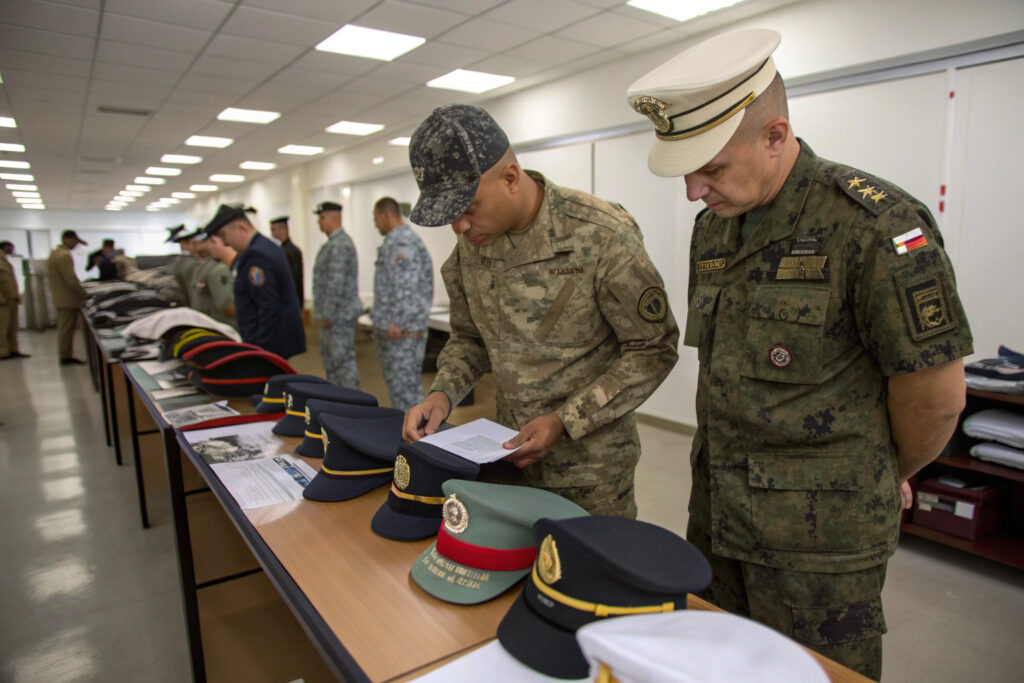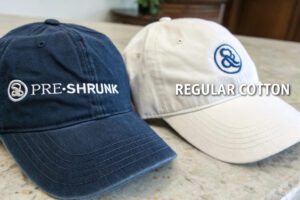Military peaked caps represent a highly specialized segment of the headwear market, requiring manufacturers who understand both precise military specifications and the nuanced requirements of different branches and units. These caps must balance traditional military aesthetics with modern comfort and durability, while meeting strict customization requirements for insignia, materials, and construction.
Custom military peaked cap suppliers typically cluster in regions with historical military manufacturing expertise, particularly areas of China and Eastern Europe with established military supply chains. The most reliable suppliers offer experience with military contracts, understanding of uniform standards, and capability to handle both small custom orders and large-scale procurement.
Finding the right supplier requires evaluating manufacturers based on their military experience, customization capabilities, quality control systems, and understanding of the specific requirements that differentiate military headwear from commercial peaked caps.
What Defines a Quality Military Peaked Cap Supplier?
Not all cap manufacturers can meet military standards, which extend beyond basic construction to encompass material specifications, precise measurements, and durability requirements that commercial headwear doesn't typically face. Understanding these differentiating factors helps identify truly capable suppliers.
Quality military peaked cap suppliers demonstrate experience with military contracts, understanding of uniform regulations, precision manufacturing capabilities, and quality control systems that ensure consistency across production runs.
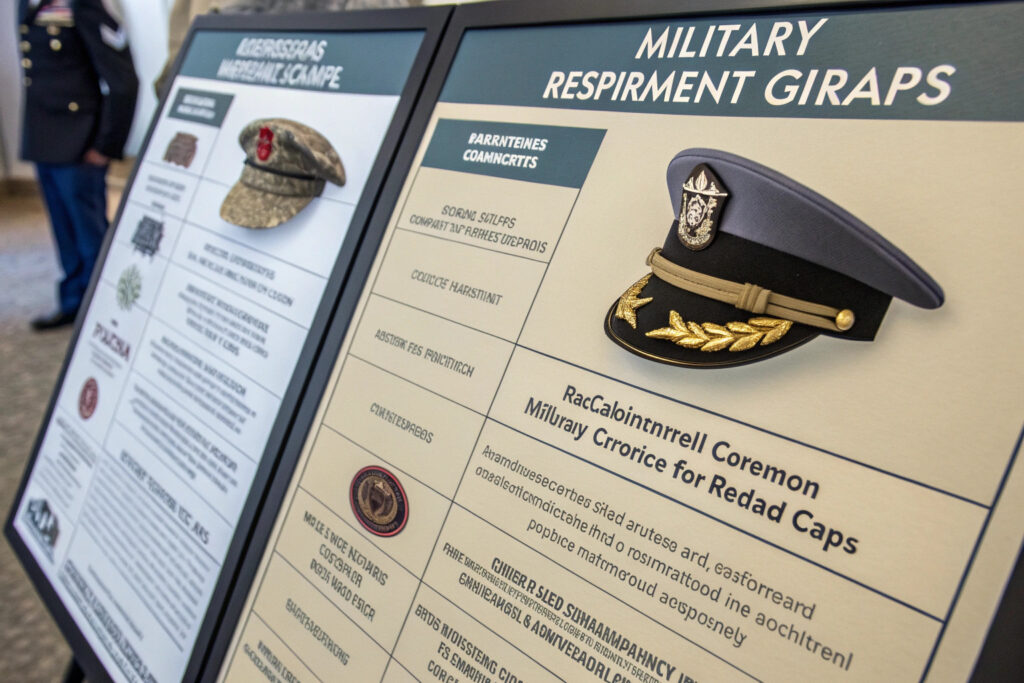
What Manufacturing Capabilities Are Essential?
Military peaked caps require specialized equipment and techniques that differ from standard cap production. The right suppliers invest in technology specifically for military-grade headwear.
We prioritize suppliers with these capabilities:
- Precision blocking equipment for consistent crown shaping
- Reinforced brim construction maintaining rigid structure
- Military-spec stitching with enhanced durability
- Insignia application expertise including embroidery and metal attachments
- Material testing facilities verifying compliance with military standards
According to Military Apparel Manufacturing Standards, proper military cap production requires 30-40% more manufacturing steps than commercial equivalents. Our manufacturing partner network includes facilities specifically equipped for military specifications with proven track records supplying armed forces worldwide.
Why is Military Contract Experience Crucial?
Suppliers with previous military contract experience understand the documentation, compliance, and quality assurance processes that differentiate military procurement from commercial manufacturing.
We work with suppliers demonstrating:
- Past military supply references with verifiable track records
- Understanding of MIL-SPEC documentation requirements
- Experience with military quality audits and inspection protocols
- Knowledge of different branch requirements (Army, Navy, Air Force, Marines)
- Familiarity with military supply chain security requirements
The Defense Procurement Association confirms that suppliers with military experience have 60% higher success rates in meeting initial quality standards. Our vetting process specifically evaluates suppliers' military contract history and understanding of defense procurement protocols.
Which Manufacturing Regions Specialize in Military Headwear?
Geographic specialization has developed around military headwear manufacturing, with certain regions building expertise through decades of supplying military contracts. Understanding these regional strengths helps in sourcing decisions.
Key manufacturing regions include specific areas of China with military production heritage, Eastern European countries with historical uniform manufacturing, and specialized facilities in South Asia that have developed military headwear expertise.
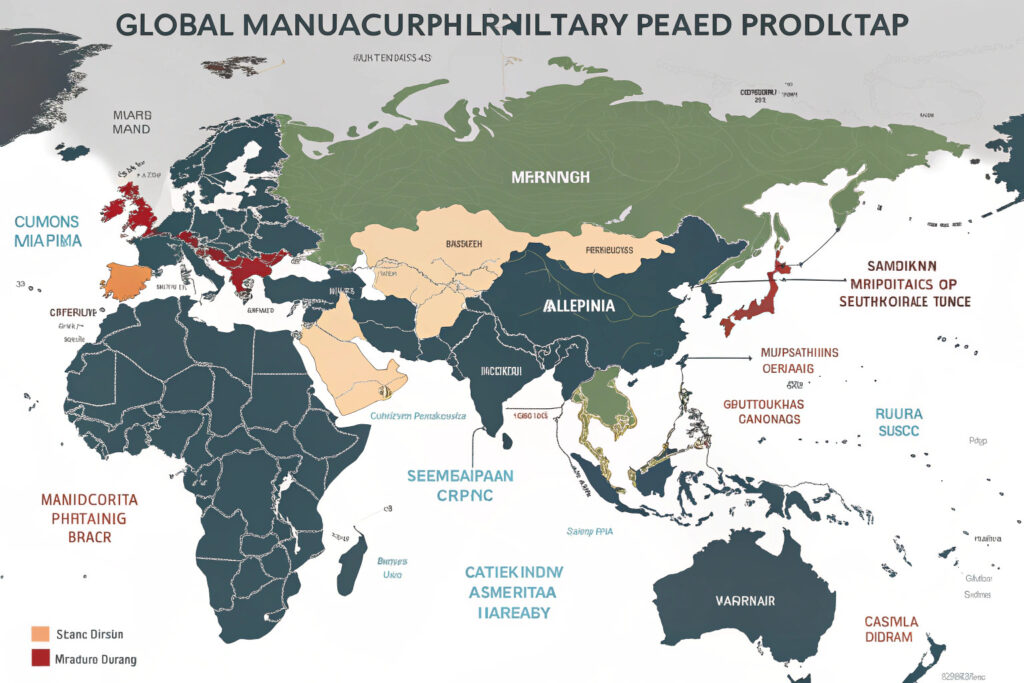
Why Do Chinese Military Manufacturing Zones Excel?
Specific regions in China, particularly around Guangzhou and Fujian province, have developed specialized military headwear capabilities through decades of supplying both domestic military needs and international contracts.
Chinese military manufacturers offer:
- Scale capabilities for large procurement orders
- Material sourcing advantages for military-grade fabrics
- Precision manufacturing infrastructure developed through electronics and technical goods
- Quality control systems refined through international brand partnerships
- Cost efficiency without compromising military standards
According to Global Defense Manufacturing analysis, Chinese military suppliers have invested heavily in meeting NATO and international military standards. Our Chinese manufacturing partners combine this technical capability with understanding of international military requirements.
What Advantages Do Eastern European Manufacturers Offer?
Eastern European countries including Poland, Romania, and Bulgaria have strong historical traditions in military uniform manufacturing, often with specific expertise in peaked caps for formal dress uniforms.
Eastern European suppliers provide:
- Historical uniform-making heritage with traditional techniques
- Understanding of European military aesthetics and traditions
- Proximity to NATO markets reducing logistics complexity
- EU manufacturing standards with rigorous quality controls
- Small-batch customization capabilities for specialized units
The European Defense Industry Association notes that Eastern European manufacturers maintain particular expertise in officer dress caps and ceremonial headwear. Our European partner network includes multi-generational uniform specialists with deep understanding of military tradition and precision.
What Customization Options Are Essential?
Military peaked caps require specific customization beyond standard commercial options, focusing on precise insignia application, regulated color matching, and structural elements that meet uniform specifications.
Essential customization includes precise insignia placement, regulated materials, branch-specific details, and structural elements that maintain military appearance standards while ensuring comfort and durability.
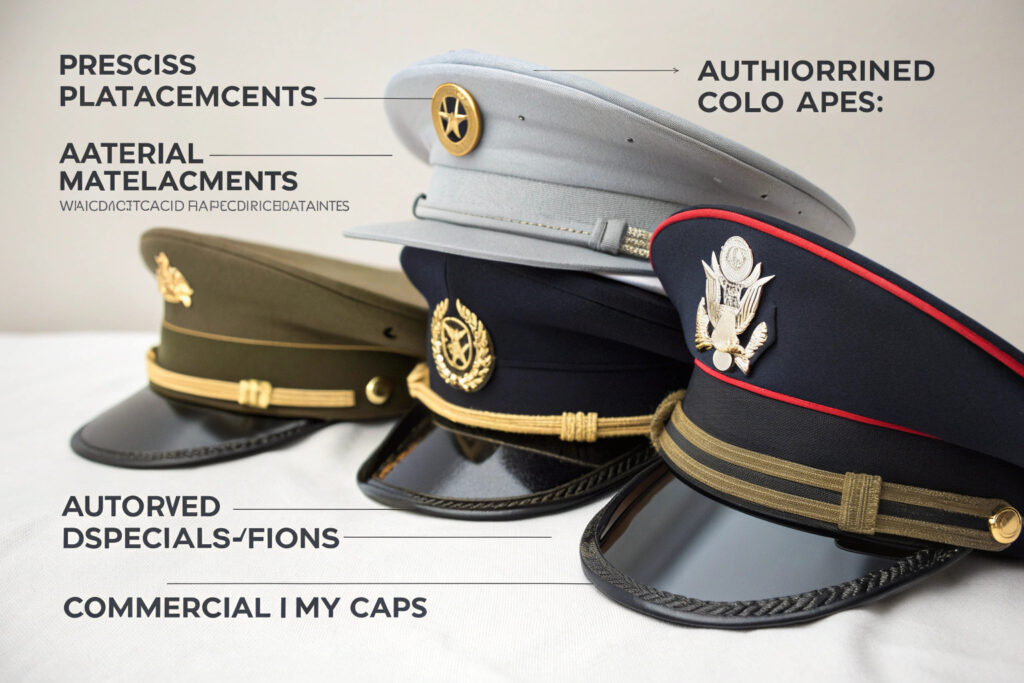
How Does Insignia Application Differ from Commercial Embroidery?
Military insignia requires precise placement, specific thread colors, and application methods that maintain appearance through rigorous use. Commercial embroidery often doesn't meet these precision requirements.
We specialize in military insignia applications including:
- Regulation-sized embroidery with precise measurement compliance
- Metal insignia attachment with secure mounting systems
- Bullion wire work for formal dress caps
- Color-fast thread selection matching military color standards
- Reinforced application ensuring longevity through field conditions
The Military Uniform Standards Commission provides detailed measurements and application guidelines. Our insignia specialists ensure all customization meets precise military requirements for placement, materials, and durability.
What Material Specifications Must Be Met?
Military peaked caps use specific materials regulated by uniform codes, often requiring specialized sourcing and verification to ensure compliance with durability and appearance standards.
We source and verify military-grade materials including:
- Regulation wool blends meeting specific weight and composition requirements
- Military-grade vinyl and patent leather for peaks
- Reinforcement materials for structure and shape retention
- Color-matched components meeting military color standards
- Durable lining materials for comfort and moisture management
According to Military Textile Specifications, proper material selection can increase cap lifespan by 200-300% compared to commercial materials. Our material verification system ensures all components meet or exceed military specifications for durability and appearance retention.
How to Verify Supplier Credentials and Quality?
Military procurement requires rigorous supplier verification to ensure quality, reliability, and compliance with specific military standards. Proper verification prevents quality issues and ensures consistent supply.
Supplier verification should encompass quality certifications, military contract history, production capability assessment, and quality control system evaluation that collectively demonstrate reliability for military supply.
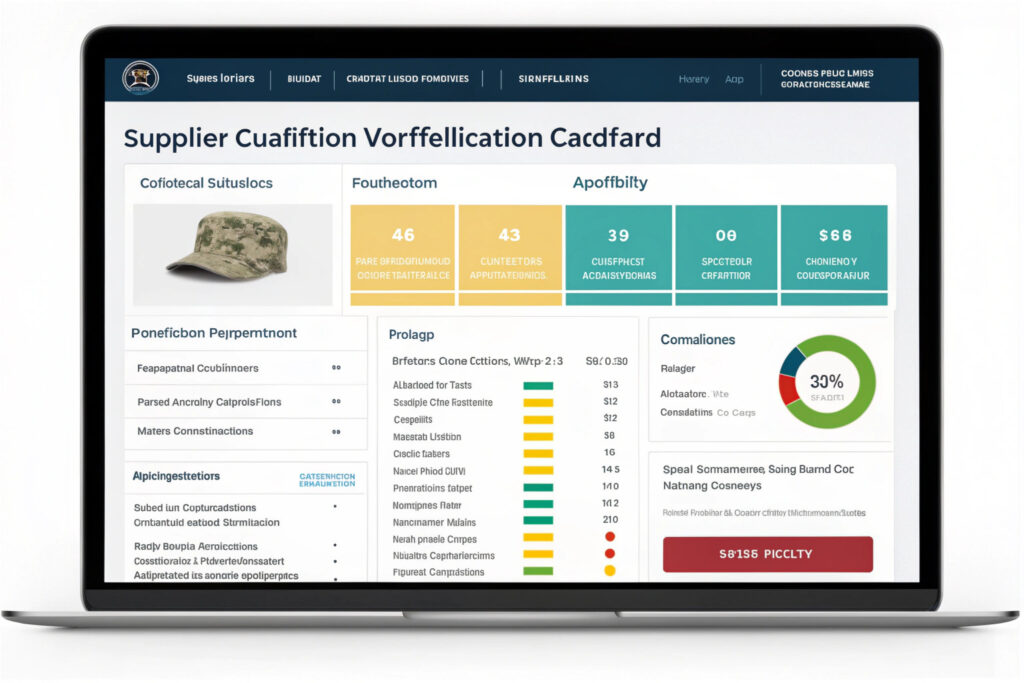
What Certifications Indicate Military Capability?
Specific certifications demonstrate a supplier's ability to meet military quality standards and maintain consistent production quality. These certifications go beyond standard manufacturing credentials.
We verify essential certifications including:
- ISO 9001:2015 with aerospace/defense scope indicating quality systems maturity
- AS9100 certification for suppliers to aviation and defense
- Military-specific quality certifications from defense organizations
- Textile testing certifications for material compliance
- Social compliance certifications ensuring ethical manufacturing
The Defense Quality Assurance Center confirms that properly certified suppliers have 70% fewer quality incidents. Our certification verification service ensures all partners maintain current, relevant certifications for military manufacturing.
How Should Production Capability Be Assessed?
Military cap production requires specific equipment, skilled labor, and quality systems that differ from commercial manufacturing. Proper capability assessment verifies these specialized resources.
We conduct comprehensive capability assessments evaluating:
- Specialized equipment for military precision requirements
- Skilled workforce with experience in military specifications
- Quality control laboratories for material and product testing
- Documentation systems for traceability and compliance
- Production capacity for both small custom orders and large procurements
According to Defense Manufacturing Assessment protocols, proper evaluation should verify at least 85% of critical military production requirements. Our assessment framework covers all essential elements for reliable military peaked cap production.
What Are the Order Quantity Considerations?
Military peaked cap orders range from small custom batches for specific units to large-scale procurement for entire branches. Understanding quantity considerations helps in supplier selection and negotiation.
Order quantity factors include minimum order requirements, production scalability, lead time variations by quantity, and cost structures that change significantly at different volume levels.
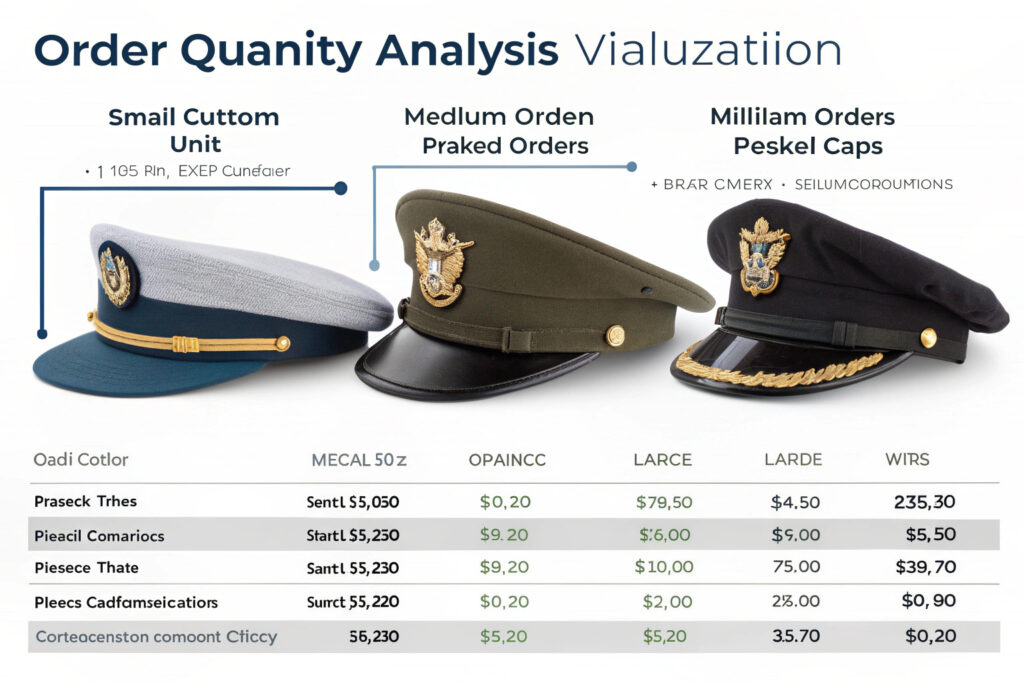
How Do Minimum Orders Vary by Supplier Type?
Different supplier types have varying minimum order requirements based on their specialization, equipment, and business model. Understanding these variations helps match order size with appropriate suppliers.
We work with suppliers across the quantity spectrum:
- Specialized workshops: 25-100 pieces for custom unit orders
- Mid-sized manufacturers: 100-500 pieces for battalion-level orders
- Large-scale producers: 500+ pieces for branch-wide procurement
- Hybrid operations: Flexible minimums using modular approaches
- Military cooperatives: Pooled ordering for multiple small units
The Military Procurement Efficiency study shows that proper supplier matching can reduce costs by 15-30% while improving quality consistency. Our supplier matching service ensures clients work with manufacturers appropriately scaled for their order volumes.
What Lead Time Realities Should Be Anticipated?
Military peaked cap production involves longer lead times than commercial headwear due to material specifications, quality verification, and customization complexity. Realistic lead time planning is essential for procurement success.
We establish realistic timelines including:
- Standard production: 8-12 weeks for established designs
- New customization: 12-16 weeks for new designs and approvals
- Large procurement: 16-20 weeks for thousands of units
- Expedited production: 6-8 weeks with premium pricing
- Prototype development: 4-6 weeks for design approval
According to Defense Supply Chain analysis, proper lead time planning improves on-time delivery by 40-50%. Our production planning service builds appropriate buffers while maintaining aggressive but achievable timelines.
Conclusion
Finding custom military peaked cap suppliers requires targeting manufacturers with specific military experience, precision capabilities, and understanding of uniform regulations. The most reliable suppliers combine technical manufacturing expertise with knowledge of military requirements and quality standards.
Successful military peaked cap procurement involves matching order requirements with appropriately scaled suppliers, verifying military-specific capabilities, and establishing realistic timelines that account for the additional quality and customization requirements of military headwear.
Ready to source custom military peaked caps that meet precise specifications? Contact our Business Director Elaine to discuss how our military manufacturing network can meet your requirements for quality, precision, and reliability. Her email is elaine@fumaoclothing.com. Let's ensure your personnel receive headwear that meets the highest standards of quality and tradition.
